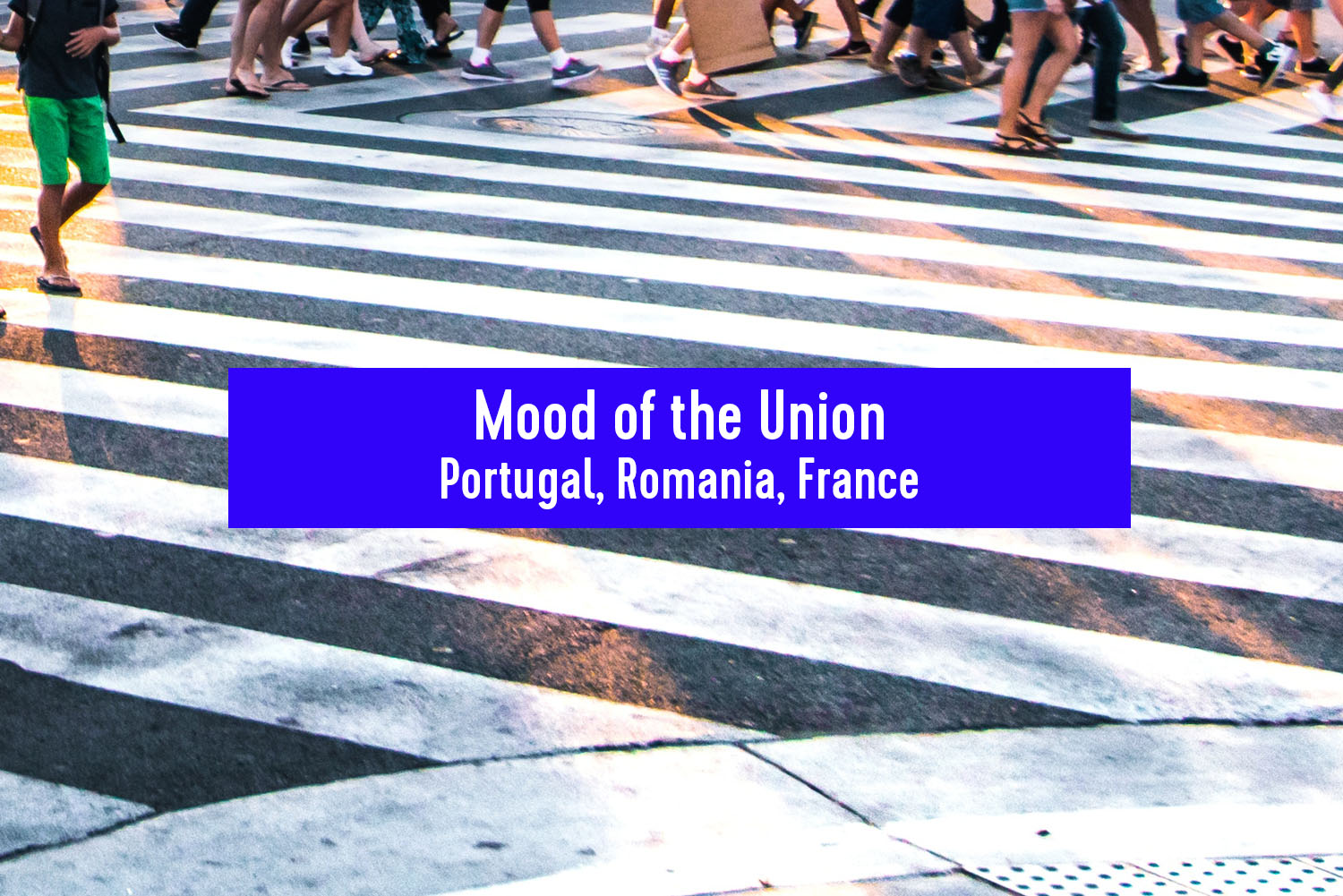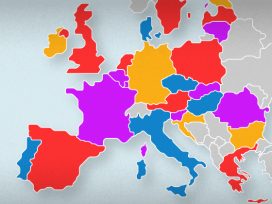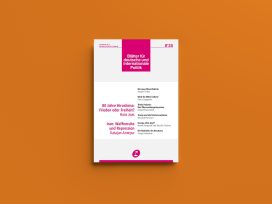The question above might reasonably be reformulated thus: could the ability to form an innovative left-leaning coalition, so influential at a domestic level to Portugal breaking free of austerity, effect a similarly startling shift in the dynamics of the European Union?
While the Left made electoral history in Portugal by consolidating upon its domestic success in the EP election, support for the ruling Social Democratic Party in Romania halved and its president departed the day after the vote to commence a three-and-a-half-year prison sentence for corruption. Meanwhile Renew Europe elects former Romanian prime minister and former European Commissioner Dacian Cioloș as its leader. The successor group of the former Alliance of Liberals and Democrats incorporates the MEPs from Emmanuel Macron’s La République En Marche! (LREM).
As Macron’s ability to forge alliances in practice is finally put to the test at the European level, the far right’s second consecutive victory in an EP election in France underlines the fact that the smallest of margins can still make a significant difference. The dynamics of the politics practiced in the European Parliament and the rationale for appointments to top EU jobs has never been trickier nor more widely discussed, as awareness grows of the fact that it is ultimately participation alone which transforms political landscapes beyond recognition.
European geringonça?
José Reis Santos, Historian, New University of Lisbon
In stark contrast to the increased turnouts across Europe, almost 70 percent of the Portuguese electorate hit the beach instead of the voting booth. Those who did show up to vote resisted the anticipated populist rightwing wave (Basta! received a mere 1.49 percent) and helped strengthen the current leftwing hegemony. The traditional Right dived deeper into depression.
In previous European elections, the electorate had tended to show the government a ‘yellow card’. This was the first EP vote in Portuguese electoral history where the governing parties were victorious and even built upon their domestic lead. Not only does the result reinforce current socialist Prime Minister António Costa’s bid to continue ruling after this autumn’s general elections, it also enhances the reach of his geringonça – the term originally used pejoratively by a conservative commentator to describe the governing leftwing coalition assembled against the odds in 2015. It can be roughly translated as ‘contraption’; and this contraption has just entered onto the European scene.
A progressive alternative
We recall that a rightwing coalition won Portugal’s 2015 general election without achieving a parliamentary majority (36 percent). The Socialist Party came second with 32 percent but was able to organize a parliamentary alliance with the Bloco de Esquerda and the Communist Party (GUE), thus uniting the Left and preventing the Social Democrat Pedro Passos Coelho from continuing his premiership. The anti-Troika parliamentary coalition, a novel departure from tradition to say the least, was scarcely expected to last a couple of months, let alone a full term in power.
With Costa at the helm, the government was able to roll back the suffocating austerity policies that had numbed the country for almost half a decade, and find a coherent and progressive alternative to TINA. Four years later, the Portuguese economy is picking up and the country’s deficit is now the lowest since the transition to multi-party democracy. Unemployment is low and Minster of Finance Mario Centeno is president of the Eurogroup. The Portuguese government is a case study for Europe when it comes to a progressive alternative to current liberal, rightwing and authoritarian-populist trends.
In defence of the European project
With this in mind, we can better understand Costa’s recent meetings with Macron and other European leaders and his attempts to bring his tactical skills to bear in Brussels, particularly with regard to preventing Manfred Weber and the EPP from taking control of the next European Commission. The next step: installing a European geringonça in the Berlaymont. A new era in European politics could well be in the offing.
Ultimately, it is not only the informal Spitzenkandidat system per se that is at stake, but who will follow Jean-Claude Juncker as President of the European Commission. If Costa and his fellow socialists are to succeed in offering a viable alternative to the last 15 years of rightwing politics in the Union, they first need the support of a qualified majority of governments in the Council and then the votes of at least 376 MEPs.
To achieve this now, having already managed to convince the EPP to drop Weber, they must carefully negotiate Junker’s replacement while taking into account that the socialists, the liberals (now Renew) and the GUE do not hold a majority among EU governments and that the EPP (with a majority in the Council) needs to receive a couple of juicy bones (i.e. top EU jobs) in order to be persuaded to abandon their claim to the top EU position.
In my opinion, such a strategy can only end in the final selection of Margrethe Vestager, as Frans Timmermans will most probably serve as a bargaining chip and thus leave the scene during the negotiation process. If Vestager does not emerge as the final selection, we will not see a Spitzenkandidat at the helm of the Commission as the Council will look elsewhere. Doing so would break the post-Lisbon Treaty relation between the European election results and their political outcome. This would amount to a setback in terms of the democratic aspects of the Union.
Either way, these post-election developments will provide a good opportunity to follow European politics in the making, hopefully a politics that is sufficiently transparent to engage European citizens. I would like to believe that Europe’s political culture has in fact already changed sufficiently to preclude the old-school backroom deals which used to render the fascinating and complex political construction that is the EU a faceless bureaucratic machine. Moreover, I would like to believe that the current crop of European leaders and MEPs can rise to the challenge and deliver a European geringonça as the necessary alternative to EPP rule. Meanwhile, in the shadows lurk the vultures Orbán, Salvini and Kaczyński, waiting to chew on the bones of Europe.
Turnout up, support for Social Democrats well down
Mircea Vasilescu, Contributing editor, Dilema Veche, Bucharest
The clear winners of the EP election in Romania were the National Liberal Party (10 seats) and the EPP group (14 seats in all, one less than in 2014) with which it is affiliated. The Social Democratic Party (PSD) only managed half of the share of the vote it won in the 2016 parliamentary elections(22 percent). This followed its attempt to change anti-corruption legislation so as to see off criminal charges against its leader, Liviu Dragnea.
The loss was expected but its scale somewhat surprising, giving the party just eight seats, the same number as Alliance 2020, a member of Renew. Pro Romania, a new party founded by ex-prime minister Victor Ponta and affiliated with the European Democratic Party, received two mandates; as did the People’s Movement Party led by former president Traian Băsescu and the Democratic Alliance of Hungarians in Romania, with both contributing to the EPP’s lead. Given that there is no ecological party in Romania, there could be no green surge here. While the final results largely confirmed the pre-election polls, the increase in turnout from 32 percent in 2014 to 49.2 percent had not been anticipated.
In defence of the rule of law and an independent judiciary
This increase was spurred by a referendum concerning the PSD’s plans for the justice system and held the same day as the EP election. Called by Romania’s president Klaus Iohannis, it asked citizens whether they would support bans on amnesties and pardons in corruption cases and on the government adopting emergency ordinances concerning the judiciary (an area that the Social Democrats had abused previously).
Complicated as that may sound, the outcome was clear: over 85 percent of voters rejected the Social Democrats’ plans. While the president himself could consider his initiative something of a personal success, the result is also to be taken as proof that Romanian citizens are willing to defend the rule of law and an independent judiciary, which the PSD had tried to subordinate in the same way as Viktor Orbán did in Hungary.
The day after the European elections, PSD president Liviu Dragnea returned to court for the last appeal in his trial concerning the fraudulent hiring of two party workers. The Supreme Court sentenced him to three years and six months in prison. The decision is final.
Nationalism, liberalism, ecology
Adrien Tallent on behalf of Esprit, Paris
Having occurred for the second time in a row, victory in France for the National Rally – formerly the National Front – now seems normal in the European elections. French anti-EU voters have triumphed once again, albeit with their lead reduced to 200,000 votes. This means that while Emmanuel Macron’s ruling LREM suffered its first electoral defeat, there was less than one percentage point between the two parties.
Narrow victory for French populists as Greens advance
Thus Marine Le Pen confirms her staying power, while her party’s 23-year-old spokesperson Jordan Bardella has carved out a robust profile for himself remarkably early in his career. Yet despite the gilets jaunes movement, Macron still achieved 22,4 percent, indicating that he is certainly not in the kind of trouble that Francois Hollande’s Socialist Party experienced in 2014, when it obtained just 14 percent. Macron wanted this election to be a plebiscite on his politics and he (almost) got away with it. Now his ability to foster alliances in practice at the European level is about to be tested too with Renew Europe.
The populist victory came amid a turnout of 51.3 percent, the highest in an EP election in France since 1994; in fact, the European elections have never been talked about so much before. This change in political climate was reflected in the success of the Greens, in the form of Europe Ecologie Les Verts led by Yannick Jadot. The party of choice for voters aged under 35, it achieved third place with 13.5 percent of the vote. The European Green wave has clearly reached young French voters, who are intensely aware of the urgency of issues raised by climate change and equally disappointed by Macron’s environmental policies. Their ideals are also about to be tested at a European level.
Continuing decline of traditional parties
The European elections were a further step toward the reconfiguration of French party politics. The lead candidate of a joint list that brought together the Socialist Party and his own Place Publique, Raphaël Glucksmann may have declared shortly after the vote that ‘the Left in France is not dead’. Yet the Socialist Party only achieved 6.2 percent, less than half of its already dramatically reduced share in 2014 and 2010.
The conservative Republicans under the leadership of the young intellectual François-Xavier Bellamy were only a little better placed. Having chalked up the worst result for the Right in its history and fourth place behind the Greens, Laurent Wauquiez resigned as the party’s president. The operations that were at the heart of French political life for decades seem to have been utterly overcome by the three dominant political ideas of the current era: nationalism, liberalism and ecology.
Finally, the leftwing party Unbowed France weighed in with 6.3 percent, making fifth place ahead of the Socialist Party. Jean-Luc Mélenchon, who came a non-too-distant fourth in the 2017 Presidential Election, has implied that he too may now take a back seat in politics.
The traditional left-right opposition seems to have been consigned to history in France. What comes to the fore instead is the disconnect between the major urban centres that backed LREM or the Greens and those areas in the north, east and southeast that voted for the National Rally.
‘Mood of the Union’ is published by Eurozine and sponsored by the ERSTE Foundation and the National Endowment for Democracy.








